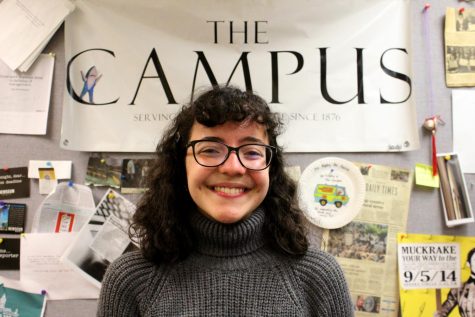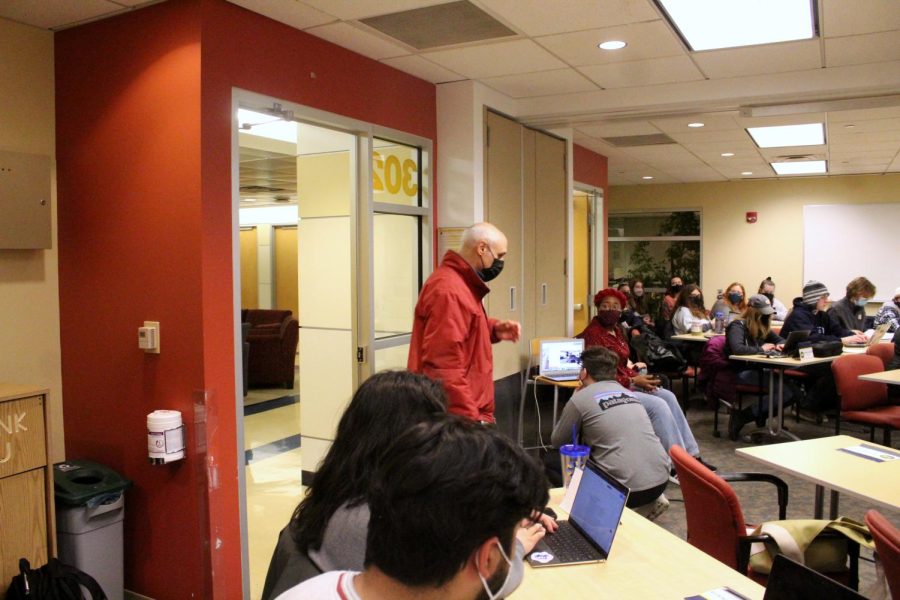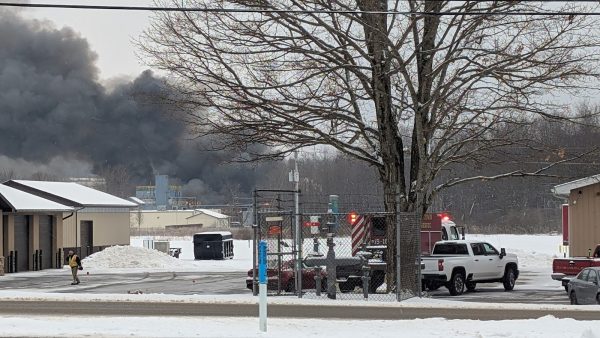Provost Ron Cole presents key points of staffing plan at ASG General Assembly
Update: On Feb. 5 President Link announced that the board of trustees unanimously approved the plan. This story has also been updated to include Provost Cole’s response to the approval.
This week’s Allegheny Student Government General Assembly featured Provost Ron Cole, ’87, who presented on the potential outcome of his faculty staffing report and the fate of certain academic programs on campus, which will be voted on by the board of trustees this weekend. A decision will be announced by Feb. 6.
According to ASG Vice President Sophie Adams, ’22, although the faculty have full access to the aforementioned report, “it is not being released in its entirety to students.”
Adams called the Assembly to order at 7:32 p.m. on Tuesday, Feb. 1, in room 301/302 of the Henderson Campus Center.
Cole began his presentation with a graph of the number of high school graduates in the United States starting in 2000 and projected into the year 2031. He pointed out that in the year 2014, the same year when the number of high school graduates nationwide declined, Allegheny was not able to meet its target for incoming students, and then between 2021 and 2022, there were natural declines in high school graduates due largely to COVID-19.
“I’d like to draw your attention to what happened starting the year (20)24-25,” Cole said. “That’s the start of a significant decrease in the population of traditional-aged high school graduates. That’s projected for the Northeast and the Midwest of the United States as much as maybe a 15% decline in the number of high school graduates.”
Cole explained that because of the inability to meet goals for student recruitments starting in the year 2014, the college began strategically recruiting fewer students to lower the size of the student body from 2,100 to about 1,700 so that resources could be distributed more effectively. COVID-19 resulted in a larger drop in student enrollment than had been planned for, with approximately 1,500 students currently enrolled.
“The prudent thing to do is to recalibrate, maintain that number … rather than try to grow once again to a larger school,” Cole said. “With fewer students, we will need fewer employees. That’s what started this whole process.”
In the years 2017-18, Allegheny launched a retirement incentive — taken by 23 faculty and 22 non-instructional staff — which helped the college level out staffing in preparation for the decreasing number of students. Cole implied that these retirements would have been enough to accomodate the shrinking student body, but the decline in enrollment due to COVID-19 exacerbated the need to reduce.
After considering student interest and the financial feasibility of maintaining academic programs, the Academic Program Review Task Force placed said programs into one of four categories: those to strategically invest in (Black Studies and Environmental Science and Sustainability), reconfigure (such as Philosophy and Religious Studies), those that will be difficult to sustain long-term (such as Journalism in the Public Interest) and those to keep. Cole clarified that every program will be adjusted to some degree, but those that were unmentioned are more stable than those presented on.
The college currently has 154 full-time faculty, though the goal is to reduce that number to 129 by the 2024-2025 academic year. Cole explained that the majority of these reductions are voluntary, either resignations or retirements, not firings or layoffs.
Cole’s plan also calls for the removal of the Chinese minor and the Geology, Film and Digital Storytelling, and Religious Studies majors. The Geology minor and Environmental Geology program will be redesigned to focus on energy and surface systems. Additionally, the plan recommends merging the Journalism in the Public Interest minor with the Film and Digital Storytelling program. These moves Cole justified by citing the low enrollment in these programs, though he emphasized that as many programs would be saved as possible. Philosophy, he noted, would be split from Religious Studies and possibly combined with Classical Studies.
Following the presentation, ASG fielded questions and comments from both constituents and fellow ASG members alike on such topics as the fate of the Dance and Movement Studies minor and what constituent Joel Zove, ’23, perceived as the lack of new information compared to what was released in December, with the Academic Program Review Task Force report. Sydney Hammerman, ’25, asked about the recommended course of action for students who have not yet declared a major and who are interested in one of the programs to be eliminated.
“We have a plan for this, but I need to let others know where they fit in the plan, so stay tuned for information about what to do if you’re in that category,” Cole said. “We will probably help you look for other areas that might align with your interests rather than continuing to pursue an area that’s going to be discontinued.”
Student response to Cole’s presentation was mixed.
Although Sasha Holguin, ’24, was glad that Cole chose to deliver it prior to the release of the final report, she did say that “it’s his job to be there” and added her belief that the approach the college was taking to adjust to the decrease in student enrollment was not “sustainable.” A Film and Digital Storytelling major and Chinese minor, she expressed concern over the future of both these departments in which she has chosen to study.
Hammerman echoed Zove’s belief that the information conveyed at this Assembly was no different from that conveyed in the December report.
“My first thought when everything ended was this was basically … with a few changes, the report we got in December,” Hammerman said. “The school wanted to be committed to transparency, and I feel like they aren’t being 100% transparent still about everything.”
Hammerman also spoke on the lack of advertising around and lack of communication outside the student committees with which Cole has been working, including the Finance and Facilities Committee translating to less student input than was claimed. If a student is not involved in these committees and is not a member of ASG, Hammerman said, “(they) don’t know anything until it’s already done.”
Later in the Assembly, Director of Finance Lucas Biniewski, ’23, said that the aforementioned Finance and Facilities Committee currently has vacancies, and students interested in filling those seats can contact Chief of Staff Genesis Pena.
Samantha Russell, ’23, and Sasha Eager, ’22, came to this particular Assembly to represent the dance department and see what was going to happen with the Dance and Movement Studies minor. Russell was “surprised and kind of annoyed that it wasn’t brought up on the slides because (Cole) did say that they were talking about revising the program.” Meanwhile, Eager “(felt) a little better that he at least made the point to say that dance is important and that it will stay somehow,” Eager said.
Although the presentation was intended to clear up ambiguities regarding academic programs and the staffing situation, like a number of other students, Zove was left with more concerns and questions than ease of mind and answers.
“I really feel like the administration could be a lot more transparent about this,” Joel Zove, ’23, said. “For one, obviously, this was an ASG meeting during module one, when a lot of students are not on campus … I am hoping for a lot more opportunities for students to have their voices heard and a lot more students to have their voices heard, especially because the burden has been on the students to reach out to the administration about what’s happening.”
One thing not discussed in the meeting, and that Zove saw as important when considering the decline in student enrollment, is the college’s decision in regards to masking on campus. Although a more recent situation, he believed it speaks to a larger issue that disabled students looking to come to Allegheny must navigate.
“It really lets disabled students know how much the administration values them and makes them choose their school accordingly based on this real lack of consideration that we’ve seen,” Zove said.
Cole emphasized multiple times through the presentation that student input – including that provided at his weekly office hours at the Henderson Campus Center, the date and time of which are posted weekly on MyAllegheny – has and will continue to be vital to the continuous restructuring of the college.
“It has helped to shape my thinking and the work that’s been done around this process,” Cole said. “Please work with us. Don’t make assumptions.”
Following the approval of the staffing plan on Feb. 5, Cole discussed how it would be put into effect. He explained that “the staffing plan will be implemented by phasing over the next several years.” Some positions will be discontinued at the end of this academic year, some will last through next year, and others may continue for the next two or three years, depending on the kind of appointment.
Regarding students who have already declared majors or minors in programs to be discontinued, Cole said that the college will begin contacting them over the next two weeks “to help them map a plan for continuing their major or minor.”
The goal is to retain the same faculty to teach these programs, but when this is not feasible, temporary faculty will have to be hired or new courses will have to be introduced. Another option for students is to find another institution offering these courses and earn credits to be transferred to Allegheny.
As stated in Link’s email, one of the majors that will be discontinued is geology. Cole had worked as a professor of geology at Allegheny prior to serving as provost and stated that although he recognizes the importance of the geosciences, he also sees the difficulties in trying to maintain the current size of the geology department. He hopes that despite the fact that the geology major will no longer be offered, the geology minor and courses in the geosciences will continue to be options for students.
“This is not a matter of thinking that the geosciences are not important,” Cole explained. “It’s a matter of trying to determine what Allegheny can continue to sustain.”
After acting as provost for four years, Cole had been asked to remain in the position an additional two years after President Mullen, the college’s previous president, retired in order to assist with the transition to President Link. He explained that due to COVID-19, Link requested that he stay another year.
“What was a four-year appointment extended to seven years,” said Cole, who is stepping down as provost at the end of the spring 2022 semester on June 30. “This is not intended to be a long-term position, and I don’t think it should be.”
Explaining that it is “healthy” to welcome new leadership and new perspectives, Cole said, “I will do everything possible to provide the best possible transition for the new provost. My goal is that they are successful in their work, because I want Allegheny to be successful going forward.”

Sofia Hassan is a second-year student from New Castle, Pennsylvania. She plans to major in English Creative Writing and minor in Middle East and North...

Sami Mirza is a senior from many different places. He is majoring in International Studies with a focus on the Middle East and North Africa and minor in...










